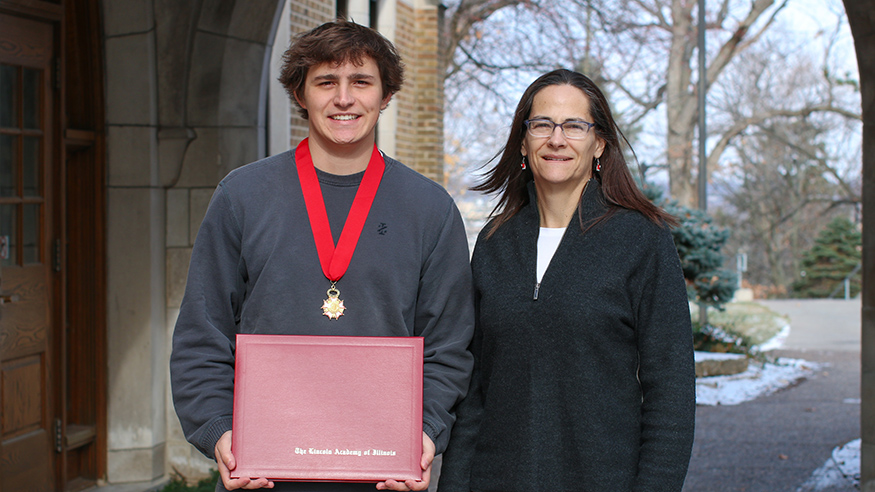2025-26 catalog
JEANETTE C. ARKLE, Assistant Professor (Environmental Studies), Program Manager of Upper Mississippi Center for Sustainable Communities
B.S., B.A., M.S. California State University, Fullerton; Ph.D., University of Cincinnati
C. KEVIN GEEDEY, Professor (Biology)
B.A., B.S., Ohio State; Ph.D., Michigan State
JASON KOONTZ, Professor (Biology), Co-Chair
B.S., Iowa State; M.S., Miami University (Ohio); Ph.D., Washington State
SARAH LASHLEY, Associate Professor (Environmental Studies)
B.A., Allegheny College; M.S., Ph.D., University of Michigan
BRITTANY L. MCCALL, Assistant Professor (Biology)
B.S., Austin Peay State University; M.S., Arkansas State University; Ph.D., Arkansas State University
MICHAEL REISNER, Associate Professor, (Environmental Studies), Co-Chair, Director Upper Mississippi Studies Center for Sustainable Communities
B.S., Montana State; J.D., University of Oregon; Ph.D., Oregon State University
VISION
The world faces pressing environmental, social, and economic sustainability challenges. Augustana College’s Environmental Studies Program equips students with the tools they need to understand and solve these challenges.
- We believe that sustainability demands improving human well-being for present and future generations while ensuring the resilience of the Earth’s ecosystems
- We believe that sustainable stewardship of social-ecological systems requires that such systems continue to provide the ecosystem services necessary to ensure human and community well-being of present and future generations.
- We believe that solving complex sustainability challenges requires using an interdisciplinary framework to evaluate interactions between the human and environmental dimensions of social-ecological systems.
- We believe that students should be capable of addressing complex, context-dependent problems that involve contested values, complex systems, and high uncertainty
- We believe that students should solve problems practically, contextually, and cooperatively in ways that serve society’s common interests
- We believe that the knowledge, skills, and values consistent with this vision are best taught by bringing students, to the degree possible in each course, into the real world of complex environmental problem solving.
Consistent with this vision, our program emphasizes the process of synthesis, integration, and analysis across disciplines to create new knowledge in the form of practical, effective solutions to sustainability challenges.
Graduates of the program will be able to make a substantial contribution towards solving complex, pressing problems within the context of helping a community address a sustainability challenge. Students will be capable of using an interdisciplinary, problem-based, solution-oriented perspective that integrates a diverse array of disciplinary knowledge, perspectives, methods, and skills. Students will be able to collaborate with academic colleagues, disciplinary professionals, and a diverse array of stakeholders to formulate alternative solutions to such problems. Students will construct knowledge and collectively apply this constructed knowledge, perspectives, methods, and skills within the context of real world sustainability problem solving.
MAJOR IN ENVIRONMENTAL STUDIES. 36 credits, distributed among Core Courses (20 credits), 1 required (4 credits), and 3 elective courses (12 credits).
Take the following five core courses (20 credits): ENVR 100 (or GEOG 106 or GEOL 102), 101, 300, 401, and 402.
Take 1 course (4 credits): GEOG 273 (Intro GIS for Natural Sciences), GEOG 274 (Intro GIS for Social Sciences), or GEOG 375 (Applied Environmental GIS).
Electives. Students must work with their advisor to design an integrated sequence of electives prior to enrolling in ENVR 300. Take 12 credits from the following courses: BIOL 324 (Techniques in Natural History), BIOL 327 (Conservation Biology), BIOL 386 (Ecology), CHEM 117 (Environmental Chemistry), ECON 221 (Environmental Economics), ENGL 230 (Environmental Literature), ENVR 385, ENVR 386,ENVR 387, ENVR 388, GEOG 105 (Weather, Climate, and Society), GEOG 106 (Earth’s Dynamic Landscape and Society), GEOG 303 (Natural Resource Management), GEOG 306 (Soil Science), GEOG 307 (Our Environmental Legacy and Our Future), GEOG 323 (Urban Planning and Environmental Justice), GEOL 101 (Physical Geology), GEOL 102 (Environmental Geology), HIST 133 (American Environment), HIST 330 (Public History and Memory), POLS 326 (Politics of Environmental Policy), SOAN 101 (Introduction to Sociology and Social Justice), SOAN 102 (Introduction to Anthropology), or SOAN 340 (Environmental Sociology).
At least two of the electives (8 credits) must be taken at the 300 or 400 level. No more than two of the electives (8 credits) can be taken from the same department. ENVR 380 may be substituted for one of the above electives on a case-by-case basis depending on the specific course offering.
MINOR IN ENVIRONMENTAL STUDIES. 24 credits, distributed among Core Courses (12 credits), 1 required (4 credits), and 2 Elective Courses (8 credits).
Take the following three core courses (12 credits): ENVR 100 (or GEOG 106 or GEOL 102), 101, and 300
Take 1 course (4 credits): GEOG 273 (Intro GIS for Natural Sciences), GEOG 274 (Intro GIS for Social Sciences), or GEOG 375 (Applied Environmental GIS)
Electives. Students must work with their advisor to design an integrated sequence of electives prior to enrolling in ENVR 300. Take 8 credits from the following courses: BIOL 324 (Techniques in Natural History), BIOL 327 (Conservation Biology), BIOL 386 (Ecology), CHEM 117 (Environmental Chemistry), ECON 221 (Environmental Economics), ENGL 230 (Environmental Literature), ENVR 385, ENVR 386, ENVR 387, ENVR 388, GEOG 105 (Weather, Climate, and Society), GEOG 106 (Earth’s Dynamic Landscape and Society), GEOG 303 (Natural Resource Management), GEOG 306 (Soil Science), GEOG 307 (Our Environmental Legacy and Our Future), GEOG 323 (Urban Planning and Environmental Justice), GEOL 101 (Physical Geology),GEOL 102 (Environmental Geology), HIST 133 (American Environment), HIST 330 (Public History and Memory), POLS 326 (Politics of Environmental Policy), SOAN 101 (Introduction to Sociology and Social Justice), SOAN 102 (Introduction to Anthropology), or SOAN 340 (Environmental Sociology).
ENVR 380 may be substituted for one of the above electives on a case-by-case basis depending on the specific course offering.
Core courses
ENVR 100, 4 credits (or GEOG 106 or GEOL 102)
ENVR 101, 4 credits
ENVR 300, 4 credits
ENVR 401, 4 credits
ENVR 402, 4 credits
Grade Point Average Notation: All courses listed in the catalog as required courses for any major and/or minor, including those courses outside of the department or with a different subject coding, are considered part of the major and will count in the grade point average. Some departments may have additional grade requirements for the courses offered within their department. Recommended supporting courses that are optional and not required may also count in the major depending on the program. For more information see your department chair or the degree requirements for Bachelor of Arts and information on Majors/Minors.
Integrative Studies



